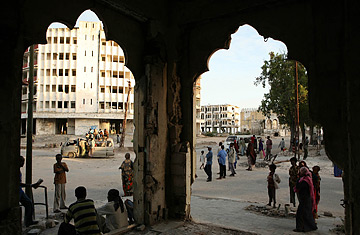
People wait for a bus outside a building in war-damaged Mogadishu.
A short drive away is Mogadishu's only public library, a privately funded institution set up eight months ago. Chief librarian Hirsie Mohamed Hirey, 38, depends on a charity in Leicester, England, to send him second-hand books. The first shipment of 31,200 contained some oddities — Disorder in Crystals, The Handbook of Hardwoods (3rd Edition, Part I) and Balancing the Load: Women, Gender and Transport by Pritanthi Fernando and Gina Porter. But there were also some surprisingly appropriate titles: The Tactical Uses of Passion by F.G. Bailey (1983), a box of The Essential Guide to Drugs and First Aid and an entire section on criminal law. Testifying to the tenacity and endurance of Somalia's entrepreneurs, Hirsie says, books on business management are the most popular.
Hirsie admits to a fondness for Shakespeare, but says he spends most of his time reading how-to business books these days. "I don't get the chance to read fiction," he says. "A man who reads a novel is a man at rest. A man in Mogadishu works 13 or 14 hours a day. We don't have time for that."
Asked to recall his reading habits before the fighting, he remembers a book called The Man Who Disappeared.
"Was it a man or was it a woman?" asks another reader, Ibrahim Mohamed Ibrahim.
"Ah, you are right. It was The Woman who Disappeared, " says Hirsie. "It was very popular in Mogadishu. It was very simple English. Even a person who had just 500 words could read that book. The story was very interesting and the English was very simple."
Ibrahim turns out to be a former bookstore owner himself. His shop, he says, used to have more than 40,000 titles in stock. He remembers Around the World in 80 Days and a book called Down the River, about a group of children who sailed downstream, got lost and had a series of adventures, as big hits among budding English readers. His own favorite authors include Jeffrey Archer and John Grisham.
Ibrahim introduces me to a friend, Ali Halane, the BBC's Arabic Service correspondent for Mogadishu. Ali is reading War and Peace. He confesses to finding it hard going.
"Ah, I read that in three days," says Ibrahim.
"What about The da Vinci Code?" asks Ali.
"Ah, this is a heartbreaking book," says Ibrahim.
"I could not stop reading it," says Ali. "Even if there is no electricity, I read it with a torch. Dan Brown, he takes you to the Vatican, then to Egypt, then to England. When I finished, I phoned Ibrahim and I told him, 'Come now! I have something great for you!' "
"And I said: 'I cannot,'" says Ibrahim. "'There are roadblocks.'"
"And I said: 'Come now or I will give it to another.'"
"So I came," says Ibrahim. "I read it in a day and a half."
"A heartbreaking book," agrees Ali. "Still I am waiting for Dan Brown to write the next volume."
